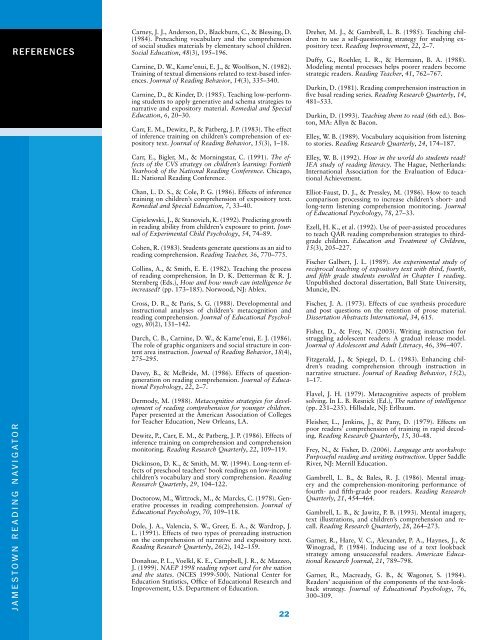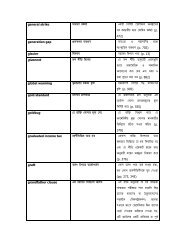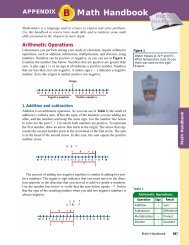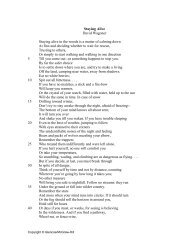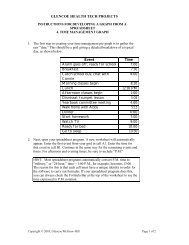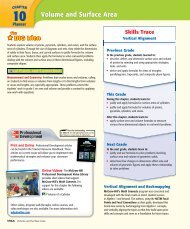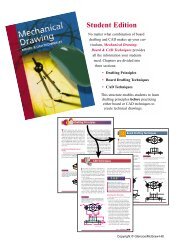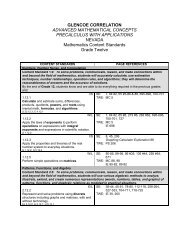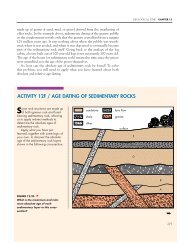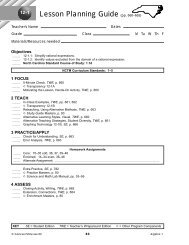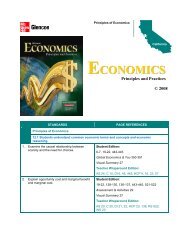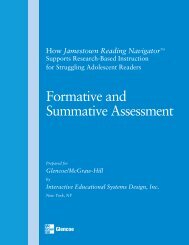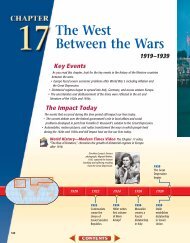Comprehension - Research
Comprehension - Research
Comprehension - Research
Create successful ePaper yourself
Turn your PDF publications into a flip-book with our unique Google optimized e-Paper software.
eferences<br />
J a m e s t o w n R e a d i n g N a v i g a t o r<br />
Carney, J. J., Anderson, D., Blackburn, C., & Blessing, D.<br />
(1984). Preteaching vocabulary and the comprehension<br />
of social studies materials by elementary school children.<br />
Social Education, 48(3), 195–196.<br />
Carnine, D. W., Kame’enui, E. J., & Woolfson, N. (1982).<br />
Training of textual dimensions related to text-based inferences.<br />
Journal of Reading Behavior, 14(3), 335–340.<br />
Carnine, D., & Kinder, D. (1985). Teaching low-performing<br />
students to apply generative and schema strategies to<br />
narrative and expository material. Remedial and Special<br />
Education, 6, 20–30.<br />
Carr, E. M., Dewitz, P., & Patberg, J. P. (1983). The effect<br />
of inference training on children’s comprehension of expository<br />
text. Journal of Reading Behavior, 15(3), 1–18.<br />
Carr, E., Bigler, M., & Morningstar, C. (1991). The effects<br />
of the CVS strategy on children’s learning: Fortieth<br />
Yearbook of the National Reading Conference. Chicago,<br />
IL: National Reading Conference.<br />
Chan, L. D. S., & Cole, P. G. (1986). Effects of inference<br />
training on children’s comprehension of expository text.<br />
Remedial and Special Education, 7, 33–40.<br />
Cipielewski, J., & Stanovich, K. (1992). Predicting growth<br />
in reading ability from children’s exposure to print. Journal<br />
of Experimental Child Psychology, 54, 74–89.<br />
Cohen, R. (1983). Students generate questions as an aid to<br />
reading comprehension. Reading Teacher, 36, 770–775.<br />
Collins, A., & Smith, E. E. (1982). Teaching the process<br />
of reading comprehension. In D. K. Detterman & R. J.<br />
Sternberg (Eds.), How and how much can intelligence be<br />
increased? (pp. 173–185). Norwood, NJ: Ablex.<br />
Cross, D. R., & Paris, S. G. (1988). Developmental and<br />
instructional analyses of children’s metacognition and<br />
reading comprehension. Journal of Educational Psychology,<br />
80(2), 131–142.<br />
Darch, C. B., Carnine, D. W., & Kame’enui, E. J. (1986).<br />
The role of graphic organizers and social structure in content<br />
area instruction. Journal of Reading Behavior, 18(4),<br />
275–295.<br />
Davey, B., & McBride, M. (1986). Effects of questiongeneration<br />
on reading comprehension. Journal of Educational<br />
Psychology, 22, 2–7.<br />
Dermody, M. (1988). Metacognitive strategies for development<br />
of reading comprehension for younger children.<br />
Paper presented at the American Association of Colleges<br />
for Teacher Education, New Orleans, LA.<br />
Dewitz, P., Carr, E. M., & Patberg, J. P. (1986). Effects of<br />
inference training on comprehension and comprehension<br />
monitoring. Reading <strong>Research</strong> Quarterly, 22, 109–119.<br />
Dickinson, D. K., & Smith, M. W. (1994). Long-term effects<br />
of preschool teachers’ book readings on low-income<br />
children’s vocabulary and story comprehension. Reading<br />
<strong>Research</strong> Quarterly, 29, 104–122.<br />
Doctorow, M., Wittrock, M., & Marcks, C. (1978). Generative<br />
processes in reading comprehension. Journal of<br />
Educational Psychology, 70, 109–118.<br />
Dole, J. A., Valencia, S. W., Greer, E. A., & Wardrop, J.<br />
L. (1991). Effects of two types of prereading instruction<br />
on the comprehension of narrative and expository text.<br />
Reading <strong>Research</strong> Quarterly, 26(2), 142–159.<br />
Donahue, P. L., Voelkl, K. E., Campbell, J. R., & Mazzeo,<br />
J. (1999). NAEP 1998 reading report card for the nation<br />
and the states. (NCES 1999-500). National Center for<br />
Education Statistics, Office of Educational <strong>Research</strong> and<br />
Improvement, U.S. Department of Education.<br />
22<br />
Dreher, M. J., & Gambrell, L. B. (1985). Teaching children<br />
to use a self-questioning strategy for studying expository<br />
text. Reading Improvement, 22, 2–7.<br />
Duffy, G., Roehler, L. R., & Hermann, B. A. (1988).<br />
Modeling mental processes helps poorer readers become<br />
strategic readers. Reading Teacher, 41, 762–767.<br />
Durkin, D. (1981). Reading comprehension instruction in<br />
five basal reading series. Reading <strong>Research</strong> Quarterly, 14,<br />
481–533.<br />
Durkin, D. (1993). Teaching them to read (6th ed.). Boston,<br />
MA: Allyn & Bacon.<br />
Elley, W. B. (1989). Vocabulary acquisition from listening<br />
to stories. Reading <strong>Research</strong> Quarterly, 24, 174–187.<br />
Elley, W. B. (1992). How in the world do students read?<br />
IEA study of reading literacy. The Hague, Netherlands:<br />
International Association for the Evaluation of Educational<br />
Achievement.<br />
Elliot-Faust, D. J., & Pressley, M. (1986). How to teach<br />
comparison processing to increase children’s short- and<br />
long-term listening comprehension monitoring. Journal<br />
of Educational Psychology, 78, 27–33.<br />
Ezell, H. K., et al. (1992). Use of peer-assisted procedures<br />
to teach QAR reading comprehension strategies to thirdgrade<br />
children. Education and Treatment of Children,<br />
15(3), 205–227.<br />
Fischer Galbert, J. L. (1989). An experimental study of<br />
reciprocal teaching of expository text with third, fourth,<br />
and fifth grade students enrolled in Chapter 1 reading.<br />
Unpublished doctoral dissertation, Ball State University,<br />
Muncie, IN.<br />
Fischer, J. A. (1973). Effects of cue synthesis procedure<br />
and post questions on the retention of prose material.<br />
Dissertation Abstracts International, 34, 615.<br />
Fisher, D., & Frey, N. (2003). Writing instruction for<br />
struggling adolescent readers: A gradual release model.<br />
Journal of Adolescent and Adult Literacy, 46, 396–407.<br />
Fitzgerald, J., & Spiegel, D. L. (1983). Enhancing children’s<br />
reading comprehension through instruction in<br />
narrative structure. Journal of Reading Behavior, 15(2),<br />
1–17.<br />
Flavel, J. H. (1979). Metacognitive aspects of problem<br />
solving. In L. B. Resnick (Ed.), The nature of intelligence<br />
(pp. 231–235). Hillsdale, NJ: Erlbaum.<br />
Fleisher, L., Jenkins, J., & Pany, D. (1979). Effects on<br />
poor readers’ comprehension of training in rapid decoding.<br />
Reading <strong>Research</strong> Quarterly, 15, 30–48.<br />
Frey, N., & Fisher, D. (2006). Language arts workshop:<br />
Purposeful reading and writing instruction. Upper Saddle<br />
River, NJ: Merrill Education.<br />
Gambrell, L. B., & Bales, R. J. (1986). Mental imagery<br />
and the comprehension-monitoring performance of<br />
fourth- and fifth-grade poor readers. Reading <strong>Research</strong><br />
Quarterly, 21, 454–464.<br />
Gambrell, L. B., & Jawitz, P. B. (1993). Mental imagery,<br />
text illustrations, and children’s comprehension and recall.<br />
Reading <strong>Research</strong> Quarterly, 28, 264–273.<br />
Garner, R., Hare, V. C., Alexander, P. A., Haynes, J., &<br />
Winograd, P. (1984). Inducing use of a text lookback<br />
strategy among unsuccessful readers. American Educational<br />
<strong>Research</strong> Journal, 21, 789–798.<br />
Garner, R., Macready, G. B., & Wagoner, S. (1984).<br />
Readers’ acquisition of the components of the text-lookback<br />
strategy. Journal of Educational Psychology, 76,<br />
300–309.


